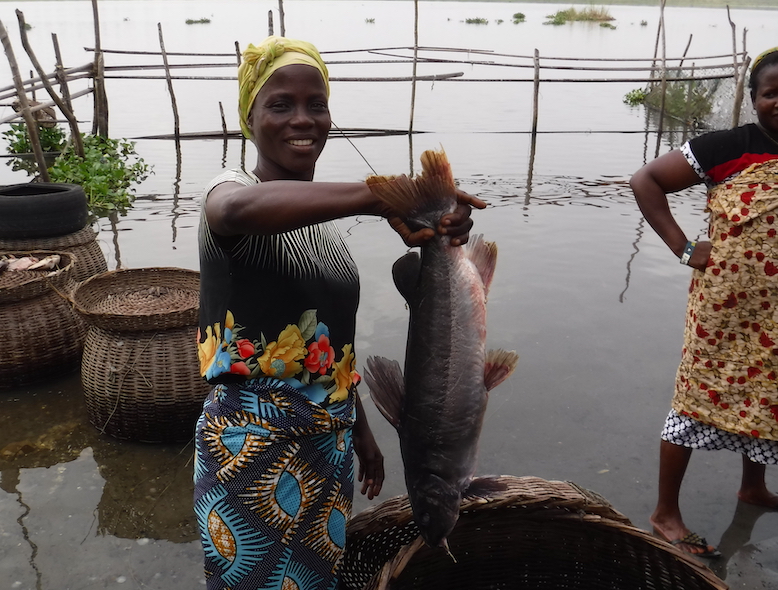
A significant factor affecting Nigerian fish farmer gains is the high cost of fish feed. For a small-scale catfish farmer in Nigeria, fishmeal comprises about 50% of aquaculture fish diets and represents 40-70% of total production cost. This conventional fishmeal production has further ripple effects on the environment and food security because fishmeal uses crude protein sourced from wild-caught bait fish, thus depleting stocks. In order to reduce fish feed cost, fish farmers often replace animal protein with grains, which can be used to produce food for direct human consumption, also affecting food security. The current supply of good quality seed is inadequate, unsustainable, and costly for the everyday small-scale fish farmer. The search for affordable and sustainable fish feed will contribute to preventing and alleviating food insecurity and improving malnutrition in Nigeria’s growing population (currently at about 200 million residents and projected to reach 440 million by 2050) through the improvement of fish availability, affordability, and accessibility. One solution to replace conventional fishmeal is through the production of insects.
Opportunities to improve livelihoods through insect farming. Insects constitute a promising opportunity to overcome the threat of food insecurity by increasing protein consumption through high-quality, locally sourced fish fed diets supplemented with farmed insect larvae, specifically the black soldier fly (BSF). The BSF is globally recognized as a beneficial insect for alternative protein production. Propagation of the BSF for use as a partial fishmeal replacement has been tested and is successful with several fish species around the world. For catfish farming, initial research on farms in the United States indicated a 30% BSF replacement in fishmeal will generate the same growth efficiency, feed intake, survival and protein efficiency, and feed conversion ratios as conventional fishmeal. At these production rates, it is expected to decrease Nigerian feed costs by about 30%. The BSF has not been comprehensively evaluated as a viable and economically enhancing fishmeal replacement for small-scale farms in Africa. Tremendous potential exists for new BSF farmers to work in collaboration with established small-scale, local fish farmers to produce affordable fish feed using integrated insect-to-fish (ITF) farming systems proposed here. Additionally, this non-pest insect species processes organic waste streams as part of its natural development from eggs to adults, thus alleviating some of the pressures of organic wastes (e.g., market waste) ending up in landfills, while producing a quality compost that can be sold by BSF farmers. Overall, the ITF farming system is expected to alleviate poverty, enhance economic growth opportunities, balance gender inequality in the fish industry, and improve nutrition through the reliable provision of fish to local communities in Nigeria.
Research Objectives. This activity will evaluate costs and conversion ratios of propagating and processing BSF into aquaculture feed; feasibility and cost-effectiveness of organic waste streams (e.g., market waste) for BSF farming; changes in pond yield and productivity resulting from BSF meal replacement in fish feed; changes in nutrient profiles of farmed fish resulting from partial BSF meal substitution in fish feed; economic viability and impacts of female-led small-scale BSF production enterprises; and effects of BSF meal production and processing on labor, time allocation, and household income for the BSF and fish farmers. We expect ITF farmers to willingly learn about and adopt BSF meal because it is a low-cost, local-input, non-mechanized technology that will produce a substantial part of the animal protein needs of fish.
Impacts and Future Directions. Innovative value-adding approaches in small-scale aquaculture, such as using insects as feed, are required to address the high costs of fish feed in Nigeria. This effort is intended to ensure the proposed ITF farming system is viable within the existing markets and private sector landscape (e.g., considering transaction costs associated with ITF system versus existing feed markets), identifies potential barriers (e.g., low access to capital for integrated ITF input costs), and avoids unintended consequences (e.g., undue pressure on women’s labor). Adoption of the BSF for fish feed production also aids in mitigating waste disposal, a crucial issue in African countries. This activity aims to ready women and youth through mentoring and workshops involved in small-scale integrated ITF farming systems. Overall, ITF farming systems will create a platform to launch the next Nigerian “agro-preneurs,” which can be scalable as resources become available, enabling small producers to eventually reach global markets.
Executive Summary of Results and Findings
Final Technical Report: Farming Insects in Nigeria
Learn More
Insect-to-Fish (ITF) Farming Systems in Nigeria: Protecting Food Security with Black Soldier Flies
